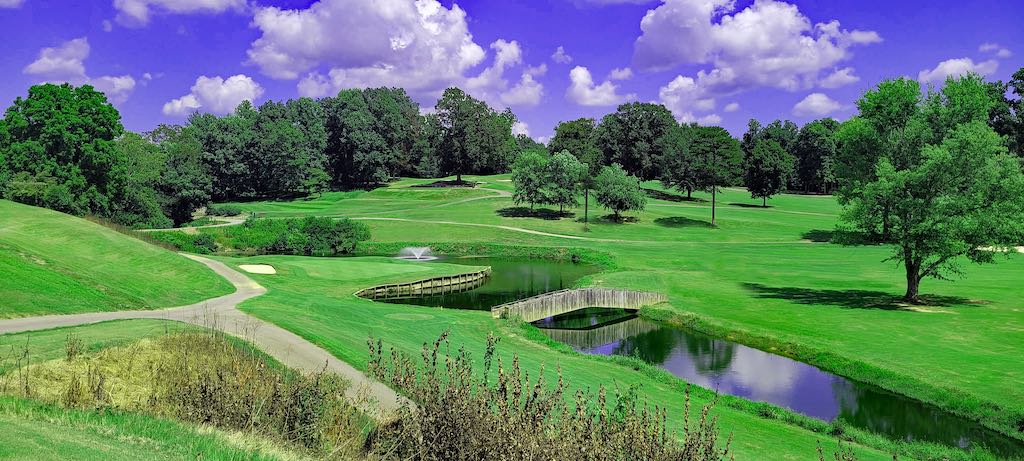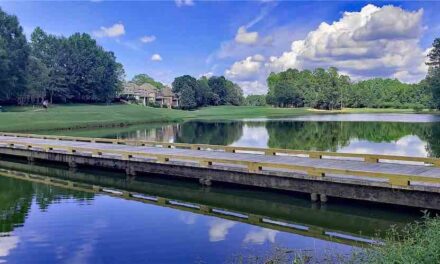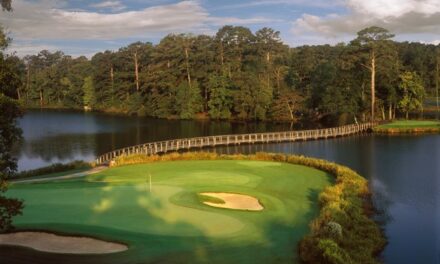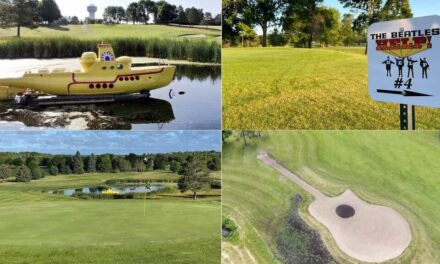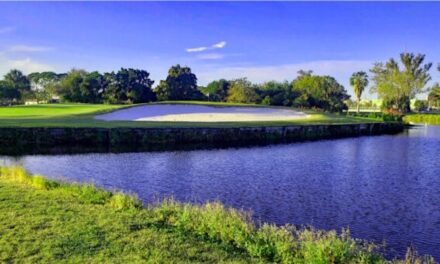Like many North Carolina country clubs I have written about, Oakwoods Country Club in Wilkesboro has a rather unique story. It’s about how a group of people who all shared the same passion for golf came together to create a country club that they could all be proud of. It’s also a story about how to take a brand-new club and make it debt-free within five years.
Oakwood’s story begins in the fall of 1952 when several prominent country club-minded citizens in Wilkes County met in the Forest Hills home of Pat M. Williams, Jr. and his wife Dottie. Approximately $100,000 was pledged toward the construction of a new golf course to be designed by soon-to-be-legendary golf architects Robert Trent Jones and J.B. McGovern. in December of 1952, the Wilkes Country Club was organized at a public meeting at the North Wilkesboro Town Hall.
Through the purchase and the execution of options, the group was able to acquire 148 acres of land at the base of the Brushy Mountains and Jones and McGovern got to work. Construction of the original nine-hole course and clubhouse began in early spring 1953 with Arthur Ham, a venerable Scot architect, serving as the course designer. What Mother Nature didn’t provide, Arthur Ham did.
In January of 1954 Wilkes Country Club was renamed Oakwoods Country Club and opened for play during that month. It seems that a lot of what went into the clubhouse was donated or done in barter for memberships. This included the clubhouse which was built on a “cost-plus” basis. Eventually, the contractor agreed to cut his fee in half and take stock in exchange. Several local manufacturers donated furniture and a local appliance dealer outfitted the kitchen free of charge. Lockers were bought and donated to the club by members who received five years of free locker rent in payment. Hence, the original clubhouse was built for around $30,000.
Oakwood continued as a 9-hole course until 1962 when then head PGA Professional Bill Greene, age 29, was asked to supervise the construction of 9 additional holes. Just before Greene was hired by Oakwoods, noted course designer Ellis Maples had been retained to stake out a potential new nine holes of golf on property adjacent to the club. Green got to work with several other hard-working members and began the arduous process of land clearing, grading, cultivation, and planting needed to bring the new nine to fruition for OCC’s avid golfer members. These additional 9 holes were built with nothing more than two 1950’s model Ford tractors, a tractor-pulled five-reel fairway mower, and a lot of blood, sweat, and tears. The new 9 featured Bermuda grass fairways and greens and opened for play in May of 1963.
With nine new holes, it was time to reroute the golf course. Holes numbers 1 and 2 of the existing nine became holes 10 and 11 of what is now the back nine and the just-completed nine holes became the front nine. This routing still exists today at Oakwood Country Club. Membership – which was around 125 when Bill Greene arrived, soon swelled to over 500.
Bill Greene retired from Oakwood Country Club in 1994 after serving the club faithfully for 32 years. He passed away in 2009. Bill and his long-time assistant Billy Hayes oversaw many of the club’s amenities and improvements over the years including the building of the tennis courts and driving range (1966), the installation of an irrigation system (1969), the paving of the parking lot (1972), a much larger swimming complex (1977), the hiring of the club’s first Green’s Superintendent (1980), and the cart shed (1992).
Dramatic elevation changes, challenging tee shots, and large undulating greens highlight your round at Oakwood Country Club. It’s a well-known fact that Oakwood has long been celebrated for the quality of its greens. You’ll encounter several water hazards and strategically placed, well-manicured bunkers.
The first hole at Oakwoods Country Club is a 162-yard par 3 that plays straight downhill and showcases the club’s elevation changes and according to Guy Carroll, Director of Golf & Clubhouse Operations, big numbers are every bit as prevalent as low numbers. It plays around 150 yards downhill and maybe the toughest 150-yard shot you’ll ever face on a starting hole! It’s not noticeable until you get to the green but there is a creek that runs along the left side.
Number 4 is a short par 5 with a hidden agenda. At only 443 yards, you’re thinking about making up a shot or two on the competition, but not so fast. It’s a dogleg left with another blind tee shot and a small fairway bunker on the right side that catches errant layup shots. A small lake guards the right side of the green and makes you think about your second shot. Two small bunkers guard the left side of this wide, shallow green.
Ten, 11, and 12 are a good trio of holes. Number 10 is a 388-yard par 4, which is handicapped as the second hardest hole on the course. If I were naming holes, this one would be called “Avoid the Creek,” because of the creek that bisects the fairway. Off the tee you’re faced with a choice: play left of the creek to the wider part of the fairway and have a little longer approach shot or play down the sliver of fairway on the right with a large hill and trees framing the right boundary. Or do what I do, take dead aim at the creek knowing I can’t possibly hit it straight and deal with the results. My ball chose the right side and I was left with an approach shot into a green that slopes right to left and is surrounded by four bunkers.
Number 11, (par 4, 336 yards) feature a blind tee shot, and if you hit it left into the valley, you’ll be faced with a long, incredibly uphill approach shot into a small green. Number 12 is a challenging par 3 that plays downhill and slightly less than the 144 yards stated on the scorecard. The green sits out on a peninsula so choose your club carefully and make a good swing. There’s a steep hill on the left side and the ball doesn’t always roll down to the bottom. Hit your tee shot over there and you’ll be faced with a tough downhill pitch shot over a bunker onto a green with water behind it. Keep it right!
Your final hole of the day ends as it started, with a challenging 174-yard par 3 that plays uphill over water and is all carry. A single bunker guards the front left of the green and the woods to the right have collected their fair share of golf balls. Par is a great way to end.
Oakwoods features a full-length driving range located across the street from the clubhouse and a large practice green behind the clubhouse so there’s no reason not to be ready when you hit the first tee. After your round, stop by the Oakwoods Grille for your favorite adult beverage and typical clubhouse fare. I can personally vouch for the grilled chicken sandwich!
Last Word. Oakwoods offers a challenging golf course that is a lot of fun to play and will keep you coming back again and again. The par 3 holes at Oakwoods Country Club can make or break a great round. On the scorecard, they are handicapped 4, 5, 7, and 14 which only proves they are not pushovers.
Oakwoods Country Club is all about golf. Period. You won’t find a pristine dining room, spa, or fancy locker room. What you will find is a swimming pool and a challenging, well-maintained golf course that is affordable for any budget. There are no initiation fees and membership categories are broken down by age. A full membership won’t run you more than $195/month no matter how old you are or how much you play. Play just twice a week and you’re averaging around $25 bucks a round. If you’re an avid golfer in the area, you can’t afford not to join.
For more information, give them a call at (336) 838-3011 or visit them online at www.oakwoodscc.com and fill out a membership application.

